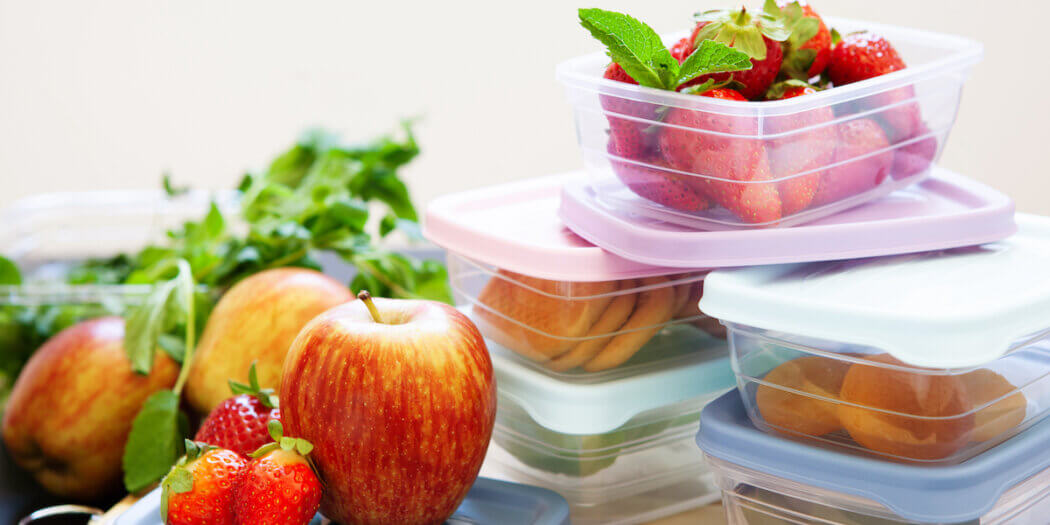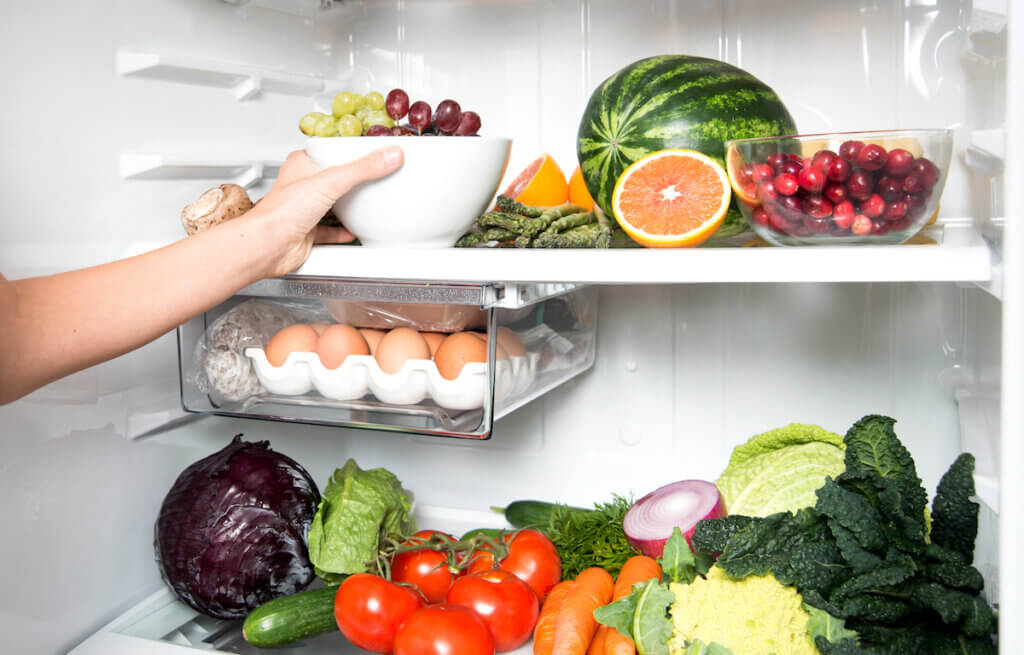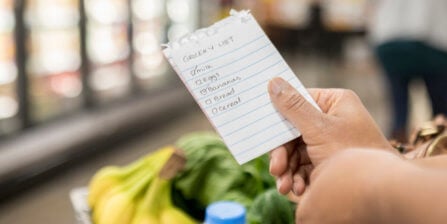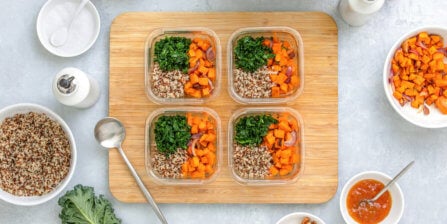Planning & Prep
How to Store Fruit for Maximum Freshness

Fruit truly is “nature’s candy.” It’s sweet, refreshing, and delicious – but it’s often just not the same if it isn’t stored correctly. Learning the ins and outs of how to store fruit will help you enjoy it when it’s at the peak of freshness and avoid having to throw away pieces that are over-ripe.
It can seem complicated at first, but once you learn the basics, you’ll be a fruit-storage expert in no time.
To refrigerate or not to refrigerate?
One of the keys to learning how to store fruit is knowing what should go in the refrigerator and what’s best left out on the counter. Here’s a quick summary for you.

Fruits that should stay out on the counter
The following fruits should remain out on the counter (or in the pantry, cupboard, or other room-temperature location) until they’re perfectly ripe. Then, if you want to keep them for a few more days, you can put them in the refrigerator.
- Apricots
- Asian pears
- Bananas
- Guava
- Kiwis
- Mangoes
- Melons
- Nectarines
- Papayas
- Passion fruit
- Peaches
- Pears
- Pineapples
- Plums
It’s also important to pay attention to airflow. When storing fruit at room temperature, avoid keeping it in plastic bags, as this can cause premature spoilage. Even if the items came in a plastic bag, you’ll want to remove them before putting them away.
Fruits that should be refrigerated
If you plan to keep apples for longer than a week or two, it’s a good idea to put them in the refrigerator as this will make them last longer. Just be sure to keep them separated from other produce items so the ethylene doesn’t cause it to spoil. Other fruits that should be stored in the refrigerator include:
- Soft berries (blueberries, blackberries, cranberries, strawberries, raspberries)
- Citrus fruit (lemons, limes, oranges)
- Figs
- Grapes
- Cherries
- Pomegranates
- Lychees
- Mangosteens
Tips for storing fruit
Knowing where to store your fruit is only half the battle. If you want your fruit to last as long as possible, you also need to know a few “best practices” for storage.
First, start with the freshest possible fruits. Taking your time when you select fruit is the first step to getting the longest shelf life out of them.
You’ll want to keep fruits like grapes, berries, and apples in their original packaging and place them in your refrigerator’s crisper drawer. If you’re going to store your fruit in plastic bags, make sure they have tiny vents to release moisture. This is particularly important for blueberries, grapes, and strawberries.
Most refrigerated fruits do well in reusable silicone pouches or containers with tight-fitting lids. This will help keep the fruit from dehydrating and protect sensitive items from ethylene gas. One exception is cherries. It’s best to keep them in an open bowl inside the refrigerator.
Important dos and don’ts
There are also some common mistakes you can make that will cause your fruit to spoil sooner than it should. For example, did you know you shouldn’t store fruits and vegetables together? Some fruits, like apples and bananas, give off high amounts of ethylene gas, which is a ripening agent. If you store them too close to vegetables and other fruits, it can cause them to ripen prematurely and quickly spoil.
Storing berries can be a challenge since they tend to start to spoil within a few days. You’ll want to eat them as soon as possible, but in the meantime, be sure to keep them cold. Also, don’t wash them until you’re ready to eat them, as this can make them spoil faster.

How to store fruit long term
If you’re going to store your fruit for an extended time, you may want to consider using specially made produce bags, which can significantly extend the life of your fruit. For even longer storage, consider freezing or canning it.
Tips for freezing fruit
Most fruit can be frozen. Frozen fruit is great in oatmeal, smoothies, and can be mixed with yogurt, used for baking muffins or bread, or used to make a fruit sauce for your waffles or pancakes.
Some fruits can be frozen whole, but it’s often more convenient to cut them into smaller pieces before freezing. To freeze berries, first wash and drain them, then spread them in a single layer on a cookie sheet before you put them in the freezer. This will help prevent them from sticking together. Once they’re hard, you can transfer them to a freezer bag and put them back in the freezer.
How long does fruit last?
While every piece of fruit is different, there are some general guidelines you can follow. Here’s a closer look at recommended storage times for fruit that is stored in the refrigerator.
- 2 to 3 days: raspberries, strawberries
- 3 to 5 days: apricots (ripe), nectarine, peaches, pineapple, plums
- 4 to 7 days: cherries, grapes, kiwi, mango, pear, rhubarb
- 1 to 2 weeks: blueberries, melons
- 2 to 3 weeks: grapefruit, oranges, watermelon
- 3 to 4 weeks: apples, cranberries
Shop for Fresh Fruit Today!
Now that you know how to store fruit the right way, you can feel confident stocking up on it! Next time you’ve got a craving for a sweet and healthy treat, head over to Instacart and add some fruit to your grocery list. A professional shopper will choose the perfect pieces for you and prepare them for you to pick up or deliver right to your door. It doesn’t get any easier than that!
Most Recent in Planning & Prep

Planning & Prep
37 Care Package Ideas: From “Get Well” to “Just Because”
It’s always nice to show some extra appreciation for your loved ones. Whether you want to support a sick friend or a neighbor who had their first child, a care package is the perfect way…
Jan 30, 2025
Planning & Prep
Average Grocery Cost per Month: The 2025 Breakdown
The average grocery cost per month, per person, in the United States is roughly $350 for adults between 19 and 50 years old in a four-person household. This estimation depends on multiple factors, such as…
Dec 23, 2024
Planning & Prep
33 Shocking Global and National Food Waste Statistics (2025)
Did you know nearly 30% of the food produced globally is never eaten? This staggering food waste statistic highlights the alarming issue of uneaten food — a problem with environmental, economic and social consequences. Food…
Dec 23, 2024








 17 Grocery List Categories to Make Shopping Easy
17 Grocery List Categories to Make Shopping Easy  How to Meal Plan: Step-by-Step Guide to Meal Planning
How to Meal Plan: Step-by-Step Guide to Meal Planning  How To Read Food Labels: Guide to Nutrition Labels
How To Read Food Labels: Guide to Nutrition Labels 

